- Home
- Kristin Cashore
Helen Keller in Love
Helen Keller in Love Read online
Helen Keller
in Love
Helen Keller
in Love
ROSIE SULTAN
VIKING
VIKING
Published by the Penguin Group
Penguin Group (USA) Inc., 375 Hudson Street, New York, New York 10014, U.S.A. • Penguin Group (Canada), 90 Eglinton Avenue East, Suite 700, Toronto, Ontario, Canada M4P 2Y3 (a division of Pearson Penguin Canada Inc.) • Penguin Books Ltd, 80 Strand, London WC2R 0RL, England • Penguin Ireland, 25 St. Stephen’s Green, Dublin 2, Ireland (a division of Penguin Books Ltd) • Penguin Books Australia Ltd, 250 Camberwell Road, Camberwell, Victoria 3124, Australia (a division of Pearson Australia Group Pty Ltd) • Penguin Books India Pvt Ltd, 11 Community Centre, Panchsheel Park, New Delhi – 110 017, India • Penguin Group (NZ), 67 Apollo Drive, Rosedale, Auckland 0632, New Zealand (a division of Pearson New Zealand Ltd) • Penguin Books (South Africa) (Pty) Ltd, 24 Sturdee Avenue, Rosebank, Johannesburg 2196, South Africa
Penguin Books Ltd, Registered Offices: 80 Strand, London WC2R 0RL, England
First published in 2012 by Viking Penguin, a member of Penguin Group (USA) Inc.
10 9 8 7 6 5 4 3 2 1
Copyright © Rosie Sultan, 2012
All rights reserved
This is a work of fiction based on real events.
LIBRARY OF CONGRESS CATALOGING IN PUBLICATION DATA
Sultan, Rosie.
Helen Keller in love / Rosie Sultan.
p. cm.
ISBN: 978-1-101-58061-5
1. Keller, Helen, 1880–1968—Fiction. I. Title.
PS3619.U455H45 2012
813′.6—dc23 2011039574
Printed in the United States of America
Designed by Carla Bolte
No part of this book may be reproduced, scanned, or distributed in any printed or electronic form without permission. Please do not participate in or encourage piracy of copyrighted materials in violation of the author’s rights. Purchase only authorized editions.
ALWAYS LEARNING
PEARSON
To my husband, David Rudner, and our son, Gabriel Sultan,
who mean everything to me.
I am so blessed.
Helen Keller
in Love
Table of Contents
Chapter One
Chapter Two
Chapter Three
Chapter Four
Chapter Five
Chapter Six
Chapter Seven
Chapter Eight
Chapter Nine
Chapter Ten
Chapter Eleven
Chapter Twelve
Chapter Thirteen
Chapter Fourteen
Chapter Fifteen
Chapter Sixteen
Chapter Seventeen
Chapter Eighteen
Chapter Nineteen
Chapter Twenty
Chapter Twenty-one
Chapter Twenty-two
Chapter Twenty-three
Chapter Twenty-four
Chapter Twenty-five
Chapter Twenty-six
Chapter Twenty-seven
Chapter Twenty-eight
Chapter Twenty-nine
Chapter Thirty
Chapter Thirty-one
Chapter Thirty-two
Chapter Thirty-three
Chapter Thirty-four
Chapter Thirty-five
Chapter Thirty-six
Chapter Thirty-seven
Chapter Thirty-eight
Chapter Thirty-nine
Chapter Forty
Afterword
Acknowledgments
Chapter One
I wait under a night sky pocked with stars I cannot see. I lean forward on the porch, the chrr-chrr-chrr of crickets thrums the warm air that vibrates against my skin; the wooden railing I hold feels cool after the day’s heat. The night around me is a bitter cup of ink, drained into my cells. Those weighty caverns of water under the earth—hungry mouths, waiting to take me in.
I cannot account for my behavior.
I have lied—to my teacher, my mother, the world. I hid from them the second miracle of my life this fall night of 1916. Because I have a secret.
I’ve never told this story. I don’t know if I can tell it now. But it’s a story I have kept out of all the speeches I’ve ever given and every one of the books I’ve written. Yet it’s the truest story I’ve lived.
Thirty-seven years old. Deaf, blind, mute. I have taken a lover, and I am in love. I can’t publicly marry because my teacher and my mother forbid it—it is their only hope of keeping me close.
But I defied them. I lied to Annie. I was tired of being perfect Helen Keller. Helen the pure; Helen the tireless worker, the saint, the good girl. I wanted to break free. And it happened very suddenly. Last summer I met a man who awoke all sorts of demons, mad cravings in me. A man who tasted like night.
Since October we’ve been secretly engaged. This is the night we will elope. I’m ready. Beside me sits my leather suitcase as I wait all through this steamy Alabama night on the porch of my sister Mildred’s house in Montgomery. I wait in silence—nothing new to me. But this silence, this dark, is not a casket; it is an opening. Life calls from the tangy woods at the edge of my sister’s house. Woods from which Peter will creep under cover of night, take my hand, and race me off to Florida, where a minister friend waits to marry us.
The night gets cooler around me, and the silence deeper. One hour, two, then four hours pass. Yet I know he will come. The people who know me best—Annie, my teacher; Mother, asleep on the second floor—could never have imagined I would deceive them, or marry and have someone to care for.
The longer I wait here the more the woods give off a vicious scent as morning breaks. I had crept out of my upstairs bedroom, suitcase in hand, at two a.m. and waited in the rocker by the piney railing for four hours, my listening feet pressed to the porch to feel the thrum, thrum, thrum of Peter’s footsteps.
I waited even as my sister Mildred heard me rocking, and got up. She woke her husband, who told her not to be afraid—it was only me on the porch: Sister Helen, he called me. They didn’t know I kept in communication with Peter Fagan; that I packed my leather bag and came down to wait for him as they slept. This is the story you will never read about in my books: how Helen Keller waited all night on this porch to elope with her lover.
Here’s the date I’ll never write: November 27, 1916. Did Peter sense trouble, and decide to stay away? Did Mildred’s husband pay him off? Or did the men come to blows in the woods? Did Peter fight back, push Mildred’s husband away, saying, “I must see Helen. She belongs with me?” Doesn’t he know I am waiting, will wait some more—will keep waiting even as this bitter sun rises—hoping to feel his footsteps on the stair? He must come.
Burning, the Alabama sun. People ask me: How can you tell the difference between night and day if you are blind? I tell them that night air is lighter; day feels heavier, more sodden with life. And as I stand up, pick up my suitcase, admit to myself that maybe my lover will not come, this air of daylight weighs more heavily on my skin than any blindness ever did.
My throat is a red knot, unraveling. I can’t go back in the house to Mother and Mildred. The sun rises like a plume of smoke, trailing until daybreak comes and the silence deepens more than any I have ever known.
I am alone. Still, he still may come … Because we had an extraordinary, passionate affair. When I think about it now, it makes my breath move fast, fast, like a train …
Chapter Two
Peter Fagan was a miracle I was not prepared for. On a hot Wisconsin night, midway through my lecture tour across the Midwest, the warm scent of corn, pond water, and dirt filled t
he tent where a crowd of farmers waited for Annie to lead me up the steps and call out the story of my life. As I stood at the base of the three wooden steps leading to the stage, I gripped the stair railing—its cool metal vibrated with the shuffle, then stomp of heavy boots, an angry tint to the air. The crowd had been waiting for a half hour.
“I can’t do it,” Annie spelled into my palm. “I just can’t.” A cough rattled her chest, and she doubled over beside me.
The steady vibration of impatient feet shuddered the ground, and I stood holding the railing.
I felt desperate, hollowed out inside. This cough kept Annie awake nights, made her skin damp as constant rain, and exhausted her so badly that for the first time since I was a child, she couldn’t climb the wooden steps to the stage; she couldn’t translate for me day and night as she always had for thirty years.
“Write to John,” I spelled into her hand as she struggled to lead me up the stairs toward the rickety stage. “After the show. Please. He’ll help. I know.”
“John wouldn’t help me if I were the last woman on earth,” she spelled into my palm.
“He’s still married to you.”
“Married? He’s a husband in name only. He lives in his own apartment in Boston with that deaf hussy. At least she won’t have to listen to him blabber on, like I did for fourteen years.”
“Annie,” I spelled into her damp palm. I felt a whoosh of air as she pushed back the stage curtain and led me out toward the waiting crowd. “He must help. He’s all we’ve got.”
On the stage Annie cut short her introduction of me. Her hand shook in mine as she called out to the crowd, “I bring you Helen Keller, the miracle.”
One thing no one tells you about being blind and deaf is this: You say what people need to hear. You leave out the rest. After our lecture, Annie walked me across the dusty road from the tent to our motel and sat me down at my Remington typewriter. “Maybe a flunky from John’s newsroom can help. But God knows he won’t respond to me. You’ll have to do the writing.” From the warped desk in our Appleton motel I pressed my fingers onto the typewriter keys. I didn’t write the whole truth. I wrote what John needed to hear:
Appleton, Wisconsin
August 1916
John Macy
Boston Herald
Boston, Mass.
Tour a great success. Several towns in Kansas, Nebraska, and now Wisconsin. I had my picture taken with the mayor of Wichita back in Kansas. Crowds everywhere. Enough profits for Annie and me to go on a vacation to Cape Cod when we get back in September.
Please, John. I know you don’t care for us as you once did; perhaps you still care enough to help us. Annie has developed a hacking cough. But the tour must continue. You above all others know how I depend on her. We still have dates to finish in Wisconsin. Can you send me a private secretary?
Helen
I didn’t write that the mayor of Wichita, Kansas, had refused to shake my hand when I told him I was a Socialist, or that we slept in drafty motel rooms to save money, Annie so ill she coughed into the morning.
A week later, over a breakfast by the train station on the way to our next town, Annie spelled John’s telegram into my palm:
Helen: Boston, Mass., 1916
Peter Fagan arrives Wisconsin Monday August 25. Work Experience: laid off Boston Herald reporter. Special Qualifications: long on time, short on cash.
Wants the job.
The cost is yours.
John
The thought of being alone with a stranger, a man, was illicit, and thrilling. All night during the long train ride through Wisconsin, I imagined my fingers tracing his cheekbone as he moved his face close to mine. The train rocked beneath me, and as I slept I dreamed Peter’s scent clung to my skin: a scent of woods and heat that made me feel deep in my being that he would change my life.
The night Peter arrived, Appleton, Wisconsin, smelled of rain. Annie and I sat despondent over the failure of that night’s audience to listen to our Chautauqua lecture when Peter slid into the billowing, creaking tent—in the night his scent came easily to me: I inhaled typewriter ink, cigarette smoke, and the strange muskrat smell I always associated with men. I held the edge of my chair and felt his footsteps as he swung closer to the stage where Annie and I sat. Annie shifted beside me, saw him, and spelled her impression into my hand: “he flips open a brown reporter’s notebook, waves a cigarette with thin, long fingers.” I lifted my head, sensing electricity in the air.
“Is he handsome?” I asked, nervously smoothing my hair.
“All I can say is thank God you’re blind.” We both laughed.
“Is he that bad?” I spelled back into her hand—familiar as my own. I cocked my head. Peter felt closer. Annie said, shifting in her chair, “He’s looking left, now right.” Annie went on, her fingers flying in my palm: “Jesus, Mary, and Joseph, his shirt is unbuttoned. And he’s got that shifty look of a person ready to flee.”
“Flee?” I leaned closer to Annie.
“His family fled Ireland,” Annie went on. “The famine. He’s a Socialist now,” she told me. “Another supporter of lost causes—like you.”
We both laughed again, but I felt a slight mocking in Annie’s palm. “Do I look all right?” Always I’ve liked men better than women; even at age seven I’d ask Annie to make me pretty. Now, dress tugged down just a bit, I sat up straighter.
“He doesn’t see you,” Annie rapped. “But he is looking. He’s turning this way. Dark hair, he’s shaking his jacket off his shoulders, and oh, brown eyes.” Relief washed through me as Peter rounded the table. Through the soles of my shoes I felt the sssaah, ssaah of his boots until he swung up to the table and grasped my hand.
“Miss Kel-ler, a pleasure to see you.” I touched his throat to hear his words and felt a twinge, very slight, that moved to the center of my heart. His voice, rough as twine, thrummed through my fingertips. I felt incapable of taking my hand away. Warm air pressed down inside the tent; the thump of footsteps told me that the crowd was filing out. Still, Peter waited for my response. With my ring finger on his vibrating larynx and my forefinger on the rough stubble of his cheek, I felt his parted lips with my thumb. A pent-up energy moved through me. Annie always told me, “For God’s sake, Helen, when you’re touching a man’s face, move fast: Read his words, then drop your hand. People gawk at you enough without seeing you lingering over some man’s drawl.”
But Peter drew me in.
“The pleasure is mine,” I spelled into his rough palm.
“The famous Helen Keller,” he repeated. “Engaged in making the world a better place.” With a quick flick of his fingers in my palm he spelled, “I’ve been following the press on you: a sold-out lecture tour across Canada in 1914, and now this current tour—two lectures a day, twenty-five cities, three different states since you left Wrentham last spring. All in the service of raising money for the blind. Am I right?” That night, under the hot dome of the tent on Wisconsin’s lakeshore, I grasped Peter’s hand in mine and felt the delicacy of his fingers.
But Peter didn’t know the whole story. The truth was harsher. Our tours—including this one—were to raise money for the blind and deaf, yes. But how could Peter have known that my father had stopped paying Annie’s salary when I was ten years old, and since my graduation from Radcliffe College, Annie and I had done our show in too many cities to count to pay the bills. We had to keep ourselves afloat.
“I’m so glad,” I blurted out. “That you’re here to help us.”
He just threw his head back and laughed, his throat a lush drink of creamy milk. “Yes, I’m engaged in the important mission of taking over for Miss Sullivan and getting you two safely home,” he said. And I believed him.
Peter turned to Annie. “I’ll take her to dinner if you’d like.” As always when I’m with two people, I held Annie’s hand with my left hand and listened as she spelled. At the same time I held my other hand to Peter’s lips and lip-read his response. His mouth moved qu
ickly, excitedly under my fingers; Annie’s spelling—usually up to eighty words per minute poured into my palm—was weary.
Peter looped his arm through mine; he led me through the tent robust with the odors of farmers, dirt tracked in on their shoes, and the scent of machinery still in their clothes. And when Peter said, “Watch your step,” I knew we were about to cross from the inside of the tent to the rough, patchy grass outside.
Just as we stood at the tent’s edge the cool night air hit me: it was filled with the vibrations of the dinner bell—pulsing and fading on Lake Bally’s shores.
“Let’s eat,” Peter said beside me. “Are you hungry?”
“Starving,” I said right back.
The steady thrum of the dinner bell chimed in the night air. As I felt its vibrations in my hands I hesitated, then stopped on the threshold of the tent.
Before walking out into the night the bell stopped tolling, leaving a fist of empty air—and I can tell you now what I did not know then: that bell was just like Peter. Booming with joy. But soon empty. Gone. I held his hand more fiercely in mine.
I live in a tangible white dark. My blind world is not shot through with blue, sultry green, or shouting red. But neither is my world black. It is not a casket; it does not close over me like death. No, my world is more a deep fog, rough to the fingers, the color of flesh.
That’s what I spelled into Peter’s smooth palm when we stood together at the threshold of the tent that Wisconsin night. He’d just asked me what everyone wanted to know but was usually too polite to ask: “What’s it like to be blind?” he’d said. “To live in the dark?” We waited for Annie to catch up; she had gone backstage to get our paycheck from the Chautauqua tour manager. My stomach rumbled with hunger; beneath my feet I felt the resounding smack of hundreds of people striding out into the night from the tent: the rapid, sharp thonk of their feet across the grass telling me they wanted to get away; our talk was not what they had wanted to hear.

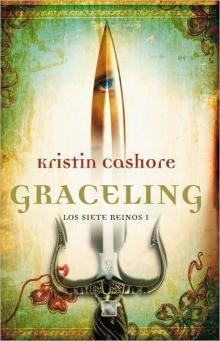 Graceling
Graceling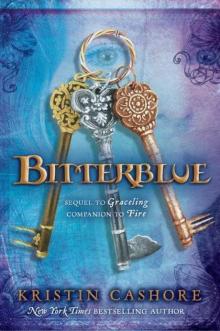 Bitterblue
Bitterblue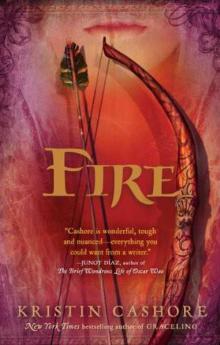 Fire
Fire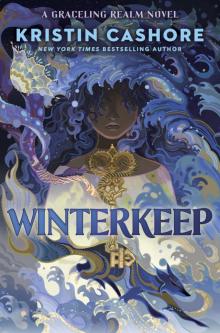 Winterkeep
Winterkeep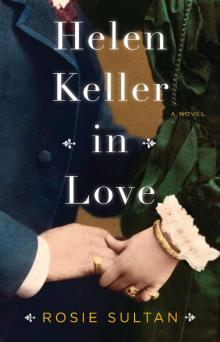 Helen Keller in Love
Helen Keller in Love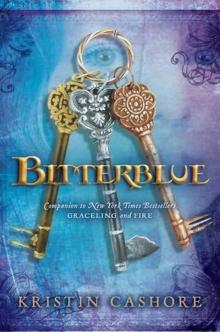 Bitterblue skt-3
Bitterblue skt-3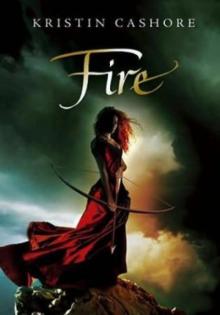 Fire skt-2
Fire skt-2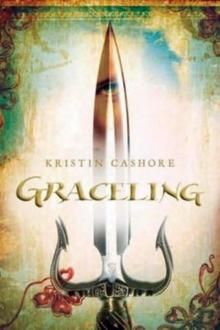 Graceling skt-1
Graceling skt-1